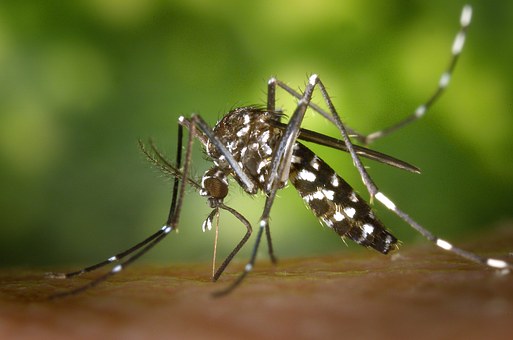Community
Animal in Bristol County tests positive for EEE, more spraying coming

BOSTON — The Massachusetts Department of Public Health (DPH) announced that laboratory testing confirmed the second case of Eastern Equine Encephalitis (EEE) virus infection, in a male between the ages of 19-30 from eastern Worcester County. This is the second human case of EEE in Massachusetts this year. The risk level in seven communities has been raised to critical as a result. A young goat in Bristol County has also tested positive for EEE, raising the risk to critical in three additional communities there.
The ten communities now at critical risk are Hopkinton in Middlesex County, and Grafton, Northbridge, Shrewsbury, Southborough, Upton, and Westborough in Worcester County. Easton, Norton and Raynham are also at critical risk. In addition, Framingham and Marlborough in Middlesex County, and Millbury, Northborough, and Sutton in Worcester County are considered at high risk.
DPH is working with the local boards of health and local Mosquito Control Projects and other mosquito control experts to coordinate surveillance and discuss appropriate public health response activities.
All residents are reminded that they should continue to use mosquito repellent and those in high and critical risk communities should consider staying indoors during the dusk to dawn hours to reduce exposure to mosquitoes.
“The most intense level of EEE activity is still being seen in Bristol and Plymouth Counties,” said Public Health Commissioner Monica Bharel, MD, MPH. “However, in active EEE years, the virus may move outside of southeastern Massachusetts. This is evidence of that movement, and residents in the area of increased risk should use mosquito repellent and avoid outdoor activities at night. ”
Last week DPH and the Massachusetts Department of Agricultural Resources (MDAR) conducted aerial spraying in specific areas of Bristol and Plymouth counties to reduce the mosquito population and public health risk. Aerial spraying began August 8 and was completed the night of August 11. A second round is being planned for this week.
In total across Massachusetts, there are 19 communities now at critical risk, 18 at high risk, and 24 at moderate risk for the EEE virus as determined by DPH.
EEE is a rare but serious and potentially fatal disease that can affect people of all ages. EEE occurs sporadically in Massachusetts with the most recent outbreak years occurring from 2004-2006 and 2010-2012. There were 22 human cases of EEE infection during those two outbreak periods with 14 cases occurring among residents of Bristol and Plymouth Counties.
EEE virus has been found in 288 mosquito samples this year, many of them from species of mosquitoes capable of spreading the virus to people.
People have an important role to play in protecting themselves and their loved ones from illnesses caused by mosquitoes.
Avoid Mosquito Bites
Apply Insect Repellent when Outdoors. Use a repellent with an EPA-registered ingredient (DEET (N, N-diethyl-m-toluamide), permethrin, picaridin (KBR 3023), oil of lemon eucalyptus [p-methane 3, 8-diol (PMD)] or IR3535) according to the instructions on the product label. DEET products should not be used on infants under two months of age and should be used in concentrations of 30% or less on older children. Oil of lemon eucalyptus should not be used on children under three years of age.
Be Aware of Peak Mosquito Hours. The hours from dusk to dawn are peak biting times for many mosquitoes. Consider rescheduling outdoor activities that occur during evening or early morning in areas of high risk.
Clothing Can Help Reduce Mosquito Bites. Wearing long-sleeves, long pants and socks when outdoors will help keep mosquitoes away from your skin.
Mosquito-Proof Your Home
Drain Standing Water. Mosquitoes lay their eggs in standing water. Limit the number of places around your home for mosquitoes to breed by either draining or discarding items that hold water. Check rain gutters and drains. Empty any unused flowerpots and wading pools, and change the water in birdbaths frequently.
Install or Repair Screens. Keep mosquitoes outside by having tightly-fitting screens on all of your windows and doors.
Protect Your Animals
Animal owners should reduce potential mosquito breeding sites on their property by eliminating standing water from containers such as buckets, tires, and wading pools – especially after heavy rains. Water troughs provide excellent mosquito breeding habitats and should be flushed out at least once a week during the summer months to reduce mosquitoes near paddock areas. Horse owners should keep horses in indoor stalls at night to reduce their risk of exposure to mosquitoes. Owners should also speak with their veterinarian about mosquito repellents approved for use in animals and vaccinations to prevent WNV and EEE. If an animal is suspected of having WNV or EEE, owners are required to report to DAR, Division of Animal Health by calling 617-626-1795 and to the Department of Public Health (DPH) by calling 617-983-6800.
-

 Community6 years ago
Community6 years agoNational Shrine of La Salette Festival of Lights 2017 set to begin
-

 Community6 years ago
Community6 years agoMassachusetts State Police looking for good home for retired dogs
-

 Crime6 years ago
Crime6 years agoFall River ranked most dangerous city in Massachusetts according to report
-

 latest6 years ago
latest6 years agoDurfee student allegedly overdoses on marijuana
-

 Community6 years ago
Community6 years agoVideo of Fall River Police goes viral
-

 Causes6 years ago
Causes6 years agoMissing Fall River woman found deceased
-

 Crime6 years ago
Crime6 years agoFall River Police add names to most wanted list
-

 Causes6 years ago
Causes6 years agoFall River teenager reported missing has been found





